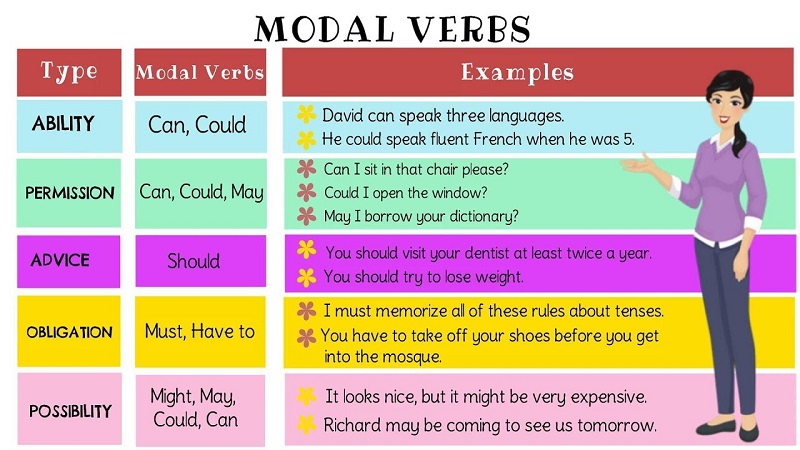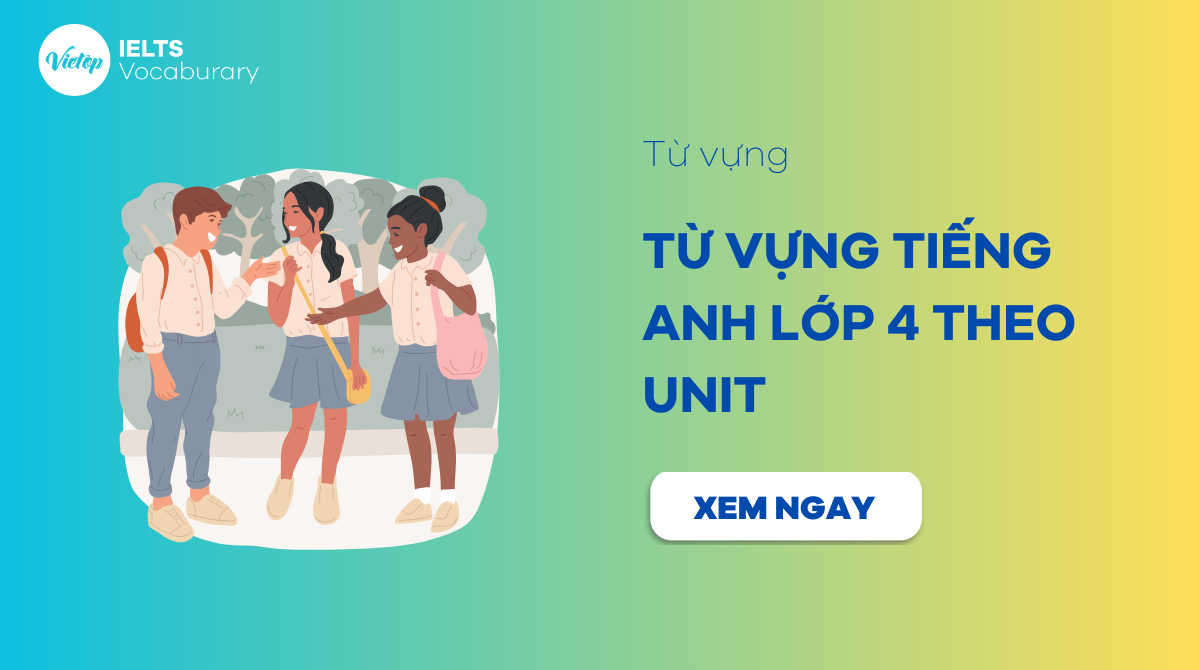Động từ khuyết thiếu (Modal Verb) là cấu trúc quan trọng thường gặp trong ngữ pháp tiếng Anh. Tuy nhiên nhiều người lại gặp khó khăn khi sử dụng chúng. Vậy nên IELTS Vietop gửi bạn một số bài tập về động từ khuyết thiếu nhằm củng cố kiến thức. Chúc các bạn học tập vui vẻ.
Cấu trúc Modal Verb
| Thể câu | Công thức |
| Khẳng định | S + modal verb + V (nguyên thể) |
| Phủ định | S + modal verb + not + V (nguyên thể) |
| Nghi vấn | (Wh_) + modal verb + S + V (nguyên thể) |
| Bị động | S + modal verb + be + Vp2V |
E.g.:
- You should play sports regularly. (Bạn nên tập thể dục thường xuyên)
- Can I help you? (Tôi có thể giúp bạn được không?)
- Might I go out? (Tôi có thể ra ngoài được không?)
Xem thêm:
Một số cấu trúc câu đề nghị trong tiếng Anh thông dụng nhất
Cấu trúc Offer: cách sử dụng, ví dụ cụ thể và bài tập vận dụng
Cấu trúc Suggest trong tiếng Anh và cách sử dụng đầy đủ nhất
Phân biệt các động từ khuyết thiếu thường gặp
| Modal verb | Ý nghĩa | Ví dụ |
| must | Nghĩa vụ bắt buộcKết quả logic/chắc chắn | He must go to school on time. (Anh ta phải đi học đúng giờ) |
| mustn’t | Ngăn cấm | You mustn’t use your phone in class. (Bạn không được sử dụng điện thoại trong lớp học) |
| can | Có khả năngSự cho phép | She can speak four languages. (Cô ý có thể nói 4 thứ tiếng) |
| could | Quá khứ của “can”Cho phép một cách lịch sự Khả năng | Could you turn that music down a little, please? (Bạn có thể vặn nhỏ nhạc một chút được không?) |
| may | Sự cho phép Khả năng xảy ra | It may rain later. (Một lúc sau có thể mưa.) |
| might | Cho phép một cách lịch sự Có khả năng xảy ra | Might I ask a question? (Tôi có thể hỏi 1 câu hỏi được không?) |
| need | Sự cần thiết | The children need make a bed after getting up. (Lũ trẻ cần dọn giường sau khi ngủ dậy) |
| should/ ought to | Đưa ra ý kiến, lời khuyên | You should see the doctor if you have a headache. (Bạn nên gặp bác sĩ nếu bạn bị đau đầu) |
Bài tập về động từ khuyết thiếu (Modal Verb)

Bài 1: Chọn động từ phù hợp
1. You ………..(should /can) listen to the new information.
2. You ………..(need/ may) park here.
3. People ………..(mayn’t/ shouldn’t) waste food.
4. ………..(will/ would) it snow tomorrow?
5. ………..(may/could) I have a cup of tea, please?
6. You ………..(ought to/ might) do more exercise.
7. You ………..(couldn’t/ mustn’t) drink alcohol if you are under 18.
8. ………..(can/should) you play the piano?
9. ………..(could/would) you like to travel with your family?
10. I ………..(won’t/ shouldn’t) play badminton tomorrow.
Bài 2: Viết lại câu sao cho nghĩa không đổi
1. He can answer the question.
……………………………………………………………
2. She wouldn’t carry the table.
……………………………………………………………
3. You should close the window.
……………………………………………………………
4. We might play cards.
……………………………………………………………
5. You should wash the car.
……………………………………………………………
6. He must fill in the form.
……………………………………………………………
7. They need not buy bread.
……………………………………………………………
8. He could not read the story.
……………………………………………………………
9. Will the teacher test our English?
……………………………………………………………
10. Could Jenny open the door?
……………………………………………………………
Xem thêm:
Bài 3: Chọn động từ thích hợp
| needn’t (x2) mustn’t (x2) must (x2) could can (x2) can’t shouldn’t might |
1. There are plenty of tomatoes in the fridge. You ……………buy any.
2. This is a hospital. You …………… smoke here.
3. He had been working for more than 11 hours. He ……………be tired now.
4. When I was a child, I ……………speak a little German.
5. The teacher said we…………… read this book for our own pleasure as it is optional. But we …………..read it if we don’t want to.
6. ………you stand on your head for more than a minute? No, I…………
7. If you want to learn to speak English fluently, you …………worry. We will help you become a fluent speaker but you have to work hard.
8. Take an umbrella. It ………….rain later.
9. People ………..walk on the grass.
10. Drivers …………stop when the traffic lights are red.
Bài 4: Điền động từ: must, mustn’t, don’t have to vào chỗ trống
I …………(1) go to school from Monday to Friday. We …………(2) wear a uniform, so I normally wear sports clothes. We ……………(3) arrive late, and we …………(4) go to every class. In class, we …………(5) shout, play or sing. We …………(6) have lunch at school, so I sometimes go home. When school finishes, I …………(7) take after my little sister. When my parents come home, I …………(8) stay in, so I usually go out with my friends. When I get home, I …………(9) do my homework. I …………(10) go to bed late, except on Fridays, when I …………(11) go to bed before midnight.
Bài 5: Chọn động từ thích hợp vào chỗ trống
Evelyn Glennie is a world-famous percussionist. Because she is 80% deaf and…………….(mustn’t/can’t) hear sounds clearly, she performs barefoot so that she ………….(need/can) feel the vibrations of her instruments and the orchestra. This ………..(should/must) be very difficult for her but she insists that people………..(should/shouldn’t)take any notice of her disability and only judge her by how well she performs. When Evelyn left school she……….(could/might)
already play the clarinet, harmonica and snare drum but at first she………..(needn’t/couldn’t)get a place in a music college because of her deafness.
After her great success, she believes that everyone with her disability………..(should/may)be given the chance to pursue a musical career if they want to. As well as being a great musician, Evelyn………….(can’t/must)also draw and paint.
Bài 6: Điền từ thích hợp vào chỗ trống
| might have could have (x2) should have had to didn’t have towould have needn’t have |
1. What ……….you …………if you had been me ? (DO)
2. I’m not sure but I think it …………………..the postman who knocked just then. (BE)
3. Nobody ……………..last night’s storm. It came as a total surprise. (PREDICT)
4. Do you think I ………………….Nick (CALL) ?
5. None of us …………..up so early , so we stayed in bed till 10. (GET)
6. Bill ……………..me these flowers. But I am delighted that he did. (SEND)
7. I think Tom ………………………here. I think saw his car. (BE)
8. We…………………..the apartment because my sister had already done it. (CLEAN)
IELTS Vietop cung cấp chương trình thi thử IELTS chuẩn thi thật với đầy đủ 4 kỹ năng Nghe, Nói, Đọc, Viết giúp bạn:
- Đánh giá trình độ IELTS hiện tại một cách chính xác
- Xác định định điểm yếu và mục tiêu cần phấn đấu.
- Làm quen với hình thức thi trên máy tính (nếu bạn chọn hình thức này).
Đăng ký ngay hôm nay để nhận lộ trình học phù hợp và cơ hội học bổng lên đến 40% học phí!
Số lượng có hạn!
Bài 7: Phân biệt be able to với can/ could…
1. The businessman from England spoke so fast that I…….. understand him.
2. I would like to……..ski so quickly.
3. I’m pretty sure Dad is at home. He ……….working at this time in the evening.
4. It………..rain this afternoon. It’s pretty cloudy already.
5. Please, have patience. I’ll……… help you soon.
6. I didn’t have the key so I ………….get inside.
7. My best friend………….. become a great athlete, but he didn’t practice enough.
8. Jimmy …………take the driving test last year because he was only 17.
9. It is a difficult question but he ………..answer it.
10. It ………..be him. He told me he’d gone to Australia
Bài 8: Điền từ thích hợp vào chỗ trống
| May – Might – Can – Can’t – should – shouldn’t – must – have to – needn’t – mustn’t don’t have to – doesn’t have to |
1. ………I use your pen please?
2. You ………..write 30 sentences for homework.
3. You ………..write 300 sentences ! 30 will be enough.
4. John ………..speak so quickly.
5. She ……….play the piano well.
6. He never does much work, but he………..
7. I am not going out today. I …………but I feel too tired.
8. You …………buy me any presents. I know you don’t have the money.
9. You …….speak French. I speak English quite well.
10. I really ……..buy a new notebook. Mine is so old.
Bài 9: Phân biệt “Must” and “Can’t”
1. You’ve been traveling the whole day. You ………..be tired.
2. Carol……..get bored on the job. She does the same things every day.
3. You are going on holiday next week. You…….be looking forward to it.
4. Bill and Sue travel a lot, so they……..be short of money.
5. They haven’t lived here very long. They……..know that many people.
6. The house is near the motorway. It………be very noisy.
7. Congratulations on passing your exam. You…….be very pleased.
8. The restaurant……………be good. It’s always empty.
9. It rained every day during their stay, so they ……….have had a nice holiday.
10. You just had lunch. You………be very hungry.
Tham khảo:
Đáp án
Bài 1
1. should 2. may 3. shouldn’t 4. Will 5. May 6. ought to
7. mustn’t 8. Can 9. Would 10. won’t
Bài 2
1. The question can be answered by him.
2. The table wouldn’t be carried by her.
3. The window should be closed by you.
4. Cards might be played by us.
5. The car should be washed by you.
6. The form must be filled in by him.
7. Bread need not be bought by them.
8. The story could not be read by him.
9. Will our English be tested by the teacher?
10. Could the door be opened by Jenny?
Bài 3
1. needn’t 2. mustn’t 3. must 4. could 5. can/ needn’t
6. can/ can’t 7. shouldn’t 8. might 9. mustn’t 10. must
Bài 4
1. must 2. don’t have to 3. mustn’t 4. mustn’t 5. mustn’t
6. don’t have lunch 7. must 8. don’t have to 9. have to 10. must
11. don’t have to
Bài 5
1. can’t 2. can 3. must 4. shouldn’t 5. could
6. couldn’t 7. should 8. can
Bài 6
1. would….have done 2. could have been 3. could have predicted
4. should have called 5. had to get 6. needn’t have sent
7. might have been 8. didn’t have to clean
Bài 7
1. couldn’t 2. be able to 3. can’t be 4. might 5. be able to
6. wasn’t able to 7. could have 8. couldn’t 9. was able to 10. can’t
Bài 8
1. May 2. must 3. don’t have to 4. shouldn’t 5. can
6. doesn’t have to 7. might 8. needn’t 9. needn’t 10. have to
Bài 9
1. must 2. must 3. must 4. can’t 5. can’t 6. must
7. must 8. can’t 9. can’t 10. can’t
Thông qua một số bài tập về động từ khuyết thiếu (Modal Verb) để vận dụng, hy vọng đã có thể hiểu hơn về điểm ngữ pháp này. IELTS Vietop cảm ơn các bạn vì đã đồng hành cùng chúng tôi trong suốt buổi học vừa rồi. Chúc các bạn học tập vui vẻ.










